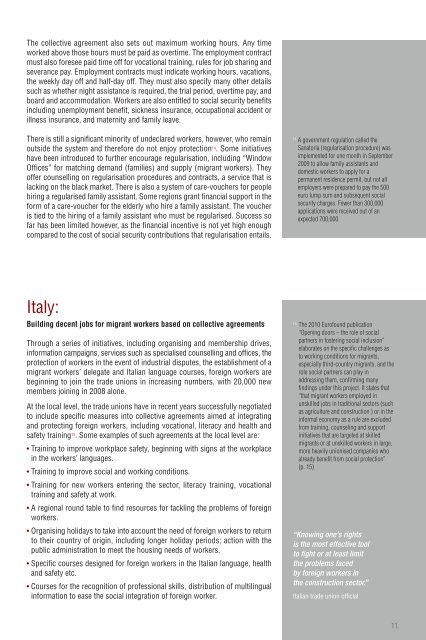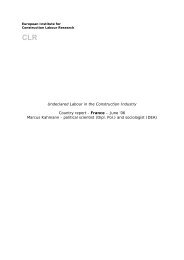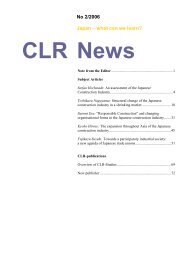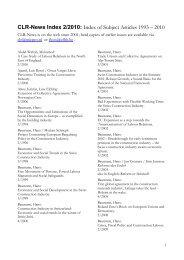SOLIDAR (2010): Social dialogue - Horus.be
SOLIDAR (2010): Social dialogue - Horus.be
SOLIDAR (2010): Social dialogue - Horus.be
You also want an ePaper? Increase the reach of your titles
YUMPU automatically turns print PDFs into web optimized ePapers that Google loves.
The collective agreement also sets out maximum working hours. Any timeworked above those hours must <strong>be</strong> paid as overtime. The employment contractmust also foresee paid time off for vocational training, rules for job sharing andseverance pay. Employment contracts must indicate working hours, vacations,the weekly day off and half-day off. They must also specify many other detailssuch as whether night assistance is required, the trial period, overtime pay, andboard and accommodation. Workers are also entitled to social security <strong>be</strong>nefitsincluding unemployment <strong>be</strong>nefit, sickness insurance, occupational accident orillness insurance, and maternity and family leave.There is still a significant minority of undeclared workers, however, who remainoutside the system and therefore do not enjoy protection 14 . Some initiativeshave <strong>be</strong>en introduced to further encourage regularisation, including “WindowOffices” for matching demand (families) and supply (migrant workers). Theyoffer counselling on regularisation procedures and contracts, a service that islacking on the black market. There is also a system of care-vouchers for peoplehiring a regularised family assistant. Some regions grant financial support in theform of a care-voucher for the elderly who hire a family assistant. The voucheris tied to the hiring of a family assistant who must <strong>be</strong> regularised. Success sofar has <strong>be</strong>en limited however, as the financial incentive is not yet high enoughcompared to the cost of social security contributions that regularisation entails.14A government regulation called theSanatoria (regularisation procedure) wasimplemented for one month in Septem<strong>be</strong>r2009 to allow family assistants anddomestic workers to apply for apermanent residence permit, but not allemployers were prepared to pay the 500euro lump sum and subsequent socialsecurity charges. Fewer than 300,000applications were received out of anexpected 700,000Italy:Building decent jobs for migrant workers based on collective agreementsThrough a series of initiatives, including organising and mem<strong>be</strong>rship drives,information campaigns, services such as specialised counselling and offices, theprotection of workers in the event of industrial disputes, the establishment of amigrant workers’ delegate and Italian language courses, foreign workers are<strong>be</strong>ginning to join the trade unions in increasing num<strong>be</strong>rs, with 20,000 newmem<strong>be</strong>rs joining in 2008 alone.At the local level, the trade unions have in recent years successfully negotiatedto include specific measures into collective agreements aimed at integratingand protecting foreign workers, including vocational, literacy and health andsafety training 15 . Some examples of such agreements at the local level are:• Training to improve workplace safety, <strong>be</strong>ginning with signs at the workplacein the workers’ languages.• Training to improve social and working conditions.• Training for new workers entering the sector, literacy training, vocationaltraining and safety at work.• A regional round table to find resources for tackling the problems of foreignworkers.• Organising holidays to take into account the need of foreign workers to returnto their country of origin, including longer holiday periods; action with thepublic administration to meet the housing needs of workers.• Specific courses designed for foreign workers in the Italian language, healthand safety etc.• Courses for the recognition of professional skills, distribution of multilingualinformation to ease the social integration of foreign worker.15The <strong>2010</strong> Eurofound publication“Opening doors – the role of socialpartners in fostering social inclusion”elaborates on the specific challenges asto working conditions for migrants,especially third-country migrants, and therole social partners can play inaddressing them, confirming manyfindings under this project. It states that“that migrant workers employed inunskilled jobs in traditional sectors (suchas agriculture and construction ) or in theinformal economy as a rule are excludedfrom training, counseling and supportinitiatives that are targeted at skilledmigrants or at unskilled workers in large,more heavily unionised companies whoalready <strong>be</strong>nefit from social protection”(p. 15)“Knowing one's rightsis the most effective toolto fight or at least limitthe problems facedby foreign workers inthe construction sector.”Italian trade union official11.









